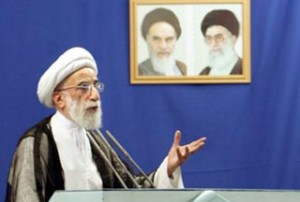
As mass trials of post-vote protesters link the unrest to opposition leaders, a senior Iranian cleric and official urges the arrest of “riot leaders”, accusing them of plotting to topple the establishment.
Ayatollah Ahmad Jannati, head of the powerful Guardian Council, said that opposition to the election results and incitement of the post-vote unrest amount to “tyranny” against “Islam, the establishment and the people” and that those responsible should be brought to justice.
“Some were arrested (in the protests) and some were not. Why weren’t the leaders behind this uproar arrested?” Jannati told worshippers during a Friday sermon in Tehran, Fars News Agency reported. “Their arrest should be the first thing that the Judiciary should do.”
The re-election of Mahmoud Ahmadinejad as president on June 12 sparked an outpouring of anger and contempt among Iranians and massive demonstrations were staged by supporters of defeated presidential candidates Mir-Hossein Mousavi and Mehdi Karroubi who claim the vote was “fraudulent”.
The crackdown on the demonstrations turned violent and some 30 people were killed and hundreds injured while Iranian police, Basij and plain-clothed forces rounded up thousands of protesters, pro-reform figures and journalists.
The unrest, meanwhile, opened up a rare divide among the ruling elite with some senior officials and clerics calling for the release of detainees to regain the “shattered” trust of the people in the system.
However, the Guardian Council — which vets legislation, political candidates and election results — announced on 29 June that the vote was the “healthiest” in the history of the revolution.
Iranian authorities also suggest that those who took to the streets in the aftermath of the disputed vote were agents of foreign powers and were paid to overthrow the government in a “velvet coup”.
On Friday, Ayatollah Jannati said parallels could be drawn between the recent uproar and the CIA-backed coup in 1953 — when the then democratically-elected Iranian prime minister, Mohammad Mosaddeq, was deposed in a military coup d’etat.
“They wanted to repeat that coup … not knowing that people were not political savvy then. [In 1953,] people did not take to the streets, and no one was martyred; thus 25 years of tyranny ruled them,” said the Principlist cleric. “But nowadays, people are well aware of the (political) situation.”
His remarks come as some 200 of the post-vote detainees, which include several foreign nationals, stand mass trials on charges of acting against Iran’s national security and conspiring with foreign powers to stage a “velvet coup” using terrorism, subversion and a mass campaign to undermine the disputed vote.
In the first two trial hearings which began on August 1, the defendants confessed to plotting against the system after hearing a general indictment against them. They also accused opposition leaders of deception and forcing them to spark “riots”.
Mousavi and Karroubi, the two public symbols of the opposition, have denounced the trials as a “sham” and claimed that confessions had been obtained under duress. Iranian officials deny the charges.
Ayatollah Jannati on July 31 assailed the opposition for “not seeing that the people are rejoicing” over the vote results and claimed that the blood of the post-election victims is on the hands of opposition leaders.
On Friday, the senior cleric urged the newly-elected Judiciary chief Ayatollah Sadeq Larijani to prosecute the “riot leaders” as his first official act.
The call has been backed by other Principlist clerics and officials as well as ranking military officers with the Islamic Revolution Guards Corps (IRGC).
Brigadier General Yadollah Javani, head of the IRGC political bureau, said last week that the prosecution of Mousavi would put an end to the country’s post-election turmoil.
“The question is who were the main plotters and agents of this coup. What is the role of (former President Mohammad) Khatami, Mousavi and Karroubi?” General Javani had said in early August.
The IRGC has been following up the post-vote developments thoroughly as the powerful paramilitary force believes no one can remain impartial following the June 12 poll.
“Today, no one is impartial. There are two currents; those who defend and support the revolution and the establishment, and those who are trying to topple it,” Gen. Javani said in early July.







